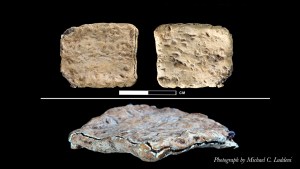A prison in Northern Israel has yielded the earliest known floor mosaic dedicated to Jesus Christ. Discovered in 2004 beneath the grounds of Megiddo Prison, the mosaic was excavated in a four-year operation that concluded in 2008. Now officials are considering moving the prison in order to make the site more accessible to visitors.
The site is believed to have once been a house of Christian worship. The Jerusalem Post reports that remnants of the structure bear the Greek inscription “to the God Jesus Christ.” Additional inscriptions point to a military officer named Gaianos as the benefactor of the mosaic floor, and a commemoration of four women named Frimilia, Kiriaka, Dorothea and Karasta.
Dr. Yotam Tepper, an academic consultant for Israel Antiquities Authority, noted that excavations of the site have revealed a network of structures that made up a village. The site contains buildings that were obviously residences, which flanked the prayer hall on both sides. There is another large building that they have yet to fully excavate.
From the structures and artifacts found at the site, experts believe that this was a multicultural settlement. Its inhabitants included Jewish and Samaritan residents, as well as a Roman army legion camp. The evidence suggests that many of the soldiers practiced the early Christian faith before it was the official religion of the Roman empire.
Dr. Tepper said:
“It is a microcosm. To have neighborhoods of so many different religions and ethnicities in such geographical proximity to each other makes this very special.” He added, “Because of the presence of different religions here it is a very interesting place to excavate and learn about the relations between the different religions … it can be a very important contribution to our knowledge.”
Moving the prison
Much of the excavation work was performed with the help of prisoners from the nearby Megiddo Prison. While the 60 inmates who took part in the work were afforded an up-close look at the historic mosaics, this may have been their last chance to view it. Now, the IAA is discussing whether or not to move the prison in order to allow for a more thorough archaeological exploration of the site.
Dr. Tepper expressed his excitement that they may soon have access to a greater swath of land to excavate. He suggested that the site may reveal more about interfaith relations between pagans and early Christians.

